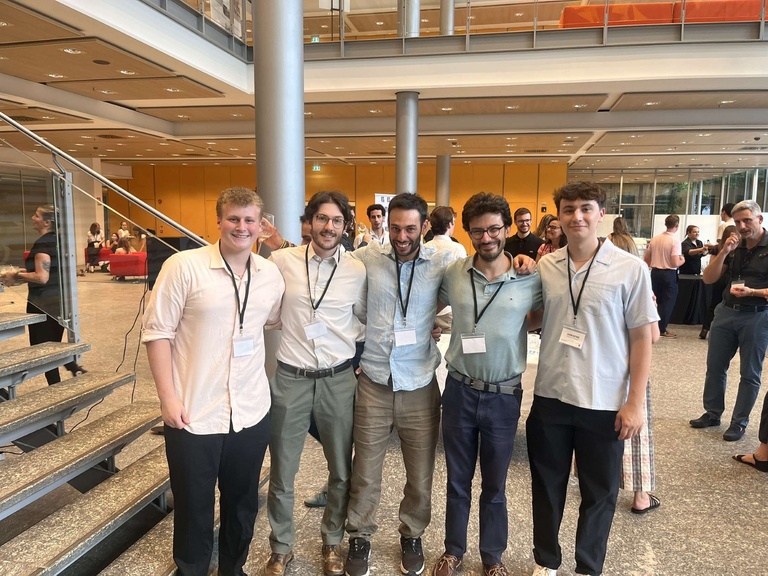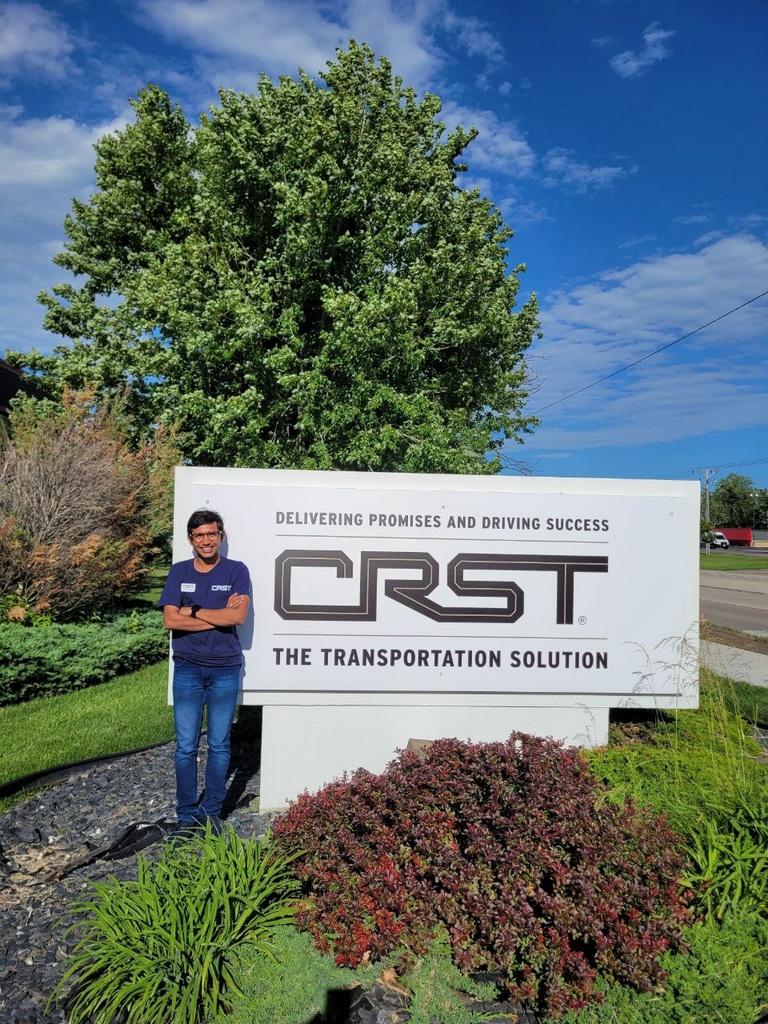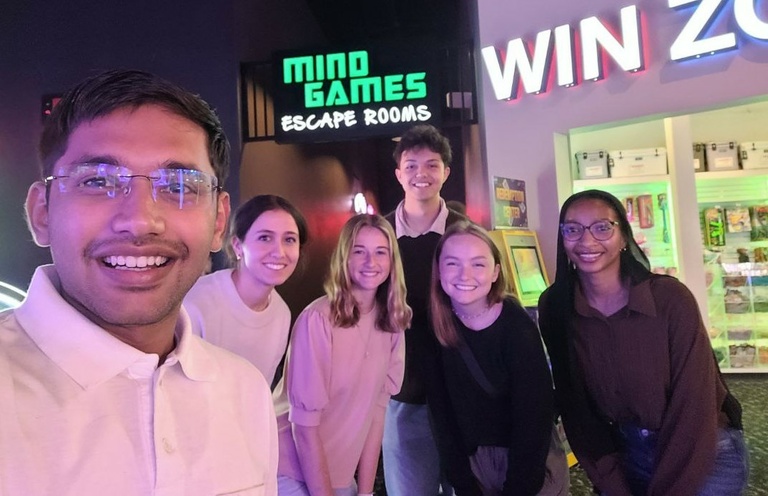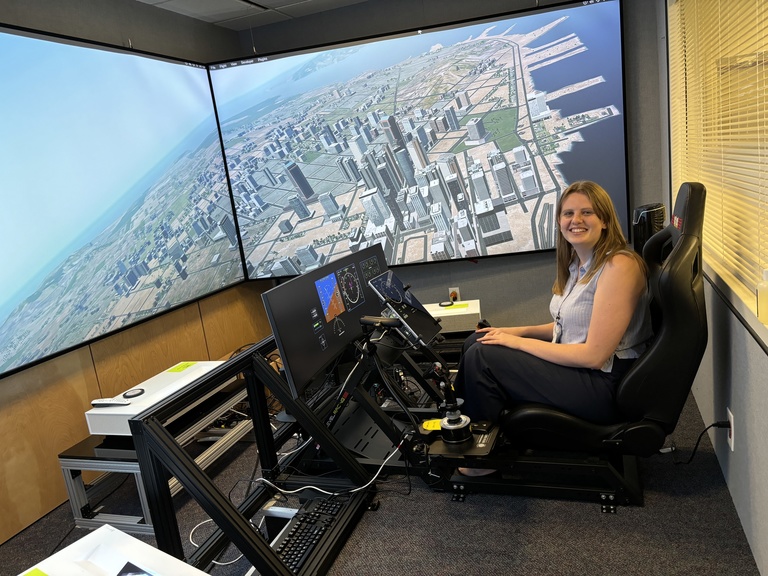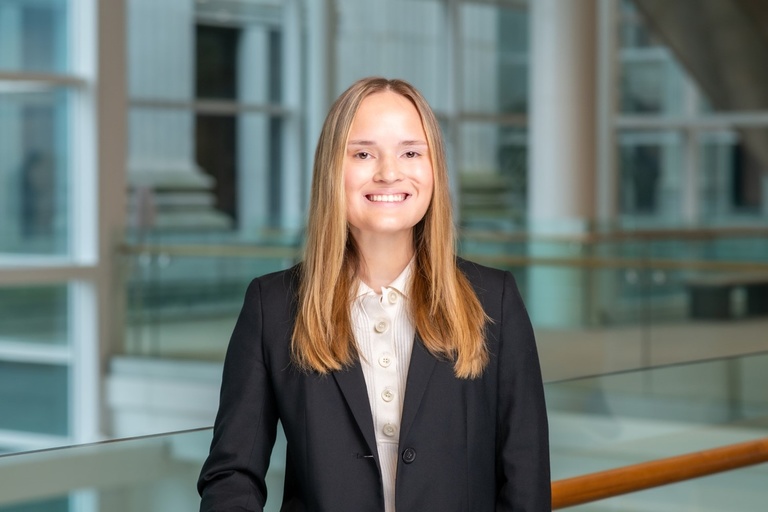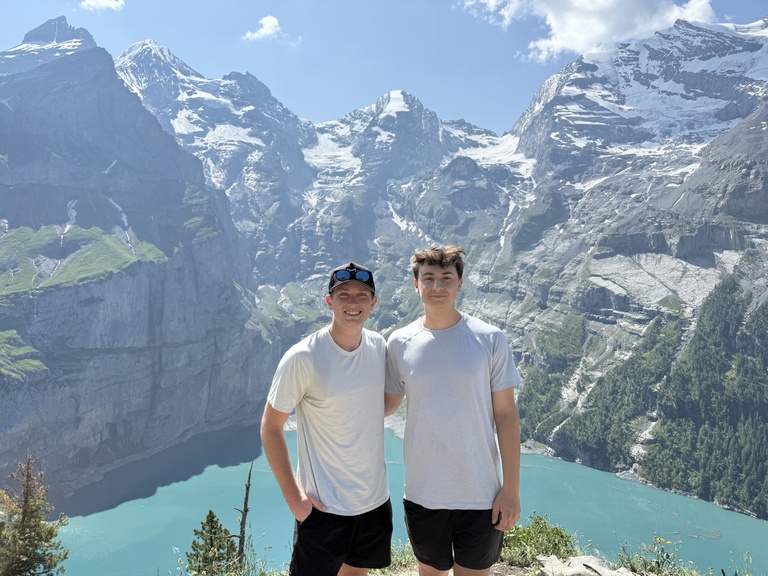Main navigation
Wondering where our students intern, what they work on, what they learn?
Recent interns of our undergraduate and graduate programs answer key questions about their internships and share valuable insights on how to get the most out of experiential learning:
See a Complete Index of Our Intern Debriefs Here...
| Student/Intern | major/degree | internship title & Employer | semester |
|---|---|---|---|
| Allen Wolf | 3rd Year - Computer Science and Engineering BSE | Pella - IT and Infrastructure Engineer Intern | Summer 2025 |
| Jaxson Gauthier | 3rd Year - Computer Science BE | Tricky Leaf - Full Stack Developer Intern | Summer 2025 |
| Veetrag Nahar | MCS | Software Engineer Intern - CRST - The Transportation Solution | Summer 2024 | Fall 2024 |
| Nathan Jankowski | 4th Year - Computer Science BS | Economics BS | Data and Analytics Intern - Discover Financial Services | Summer 2024 |
| Vincent Cai | MCS | PhD in Composition (2023) | Software Engineer Intern - Casey's | Summer 2024 |
| Liao Zhu | 4th Year - Computer Science BS | Mathematics BS | Amazon SURE Fellow - Columbia University | Summer 2024 |
| Liz Elias | 4th Year - Computer Science BA | Microbiology BS | POE Computational Intern - St. Jude's | Summer 2024 |
| Isabelle Paulsen | 4th Year - Computer Science BS | U2G | Software Engineer - Collins Aerospace | Summer 2024 |
| Osama Khalid | PhD - Computer Science | Software Engineer - Google | Summer 2023 |
| Shihui Song | PhD - Computer Science | Research Aid - Argonne National Laboratory | Summer 2023 |
| Benjamin Wilson-Langman | 4th Year - Data Science | Software Engineer - Walmart Global Tech | Summer 2023 |
| Quoc Vu | 3rd Year - Computer Science BA | Service Engineer - Collins Aerospace | Summer 2023 |
| Madison Krohn | 2nd Year - Computer Science BS | Software Engineer - Northwestern Mutual | Summer 2023 |
| Patrick Foster | 4th Year - Computer Science BA | BAIS BBA | Software Engineer Intern - GoDaddy | JP Morgan | Summer 2023 | 2022 |

Allen Wolf
Major(s): Computer Science and Engineering BSE
Interned at Pella Corporation Headquarters
Read More in Allen Wolf's Internship Debrief...
What did a typical day look like as an IT & Infrastructure intern at Pella?
I usually started my day around 7:15 AM by checking Teams and email, then began working on assigned projects. Some days I reviewed existing systems, such as services deployed on Docker, and explored how they could be migrated to Kubernetes. On other days, I focused on learning new technologies independently. When my mentor arrived, I shared updates on my progress and asked questions. Some mornings, I met my team for coffee at the on‐campus café.
Pella also hosted many events such as executive roundtables, plant tours, and other activities that offered insight into how the company grows, competes, and innovates.
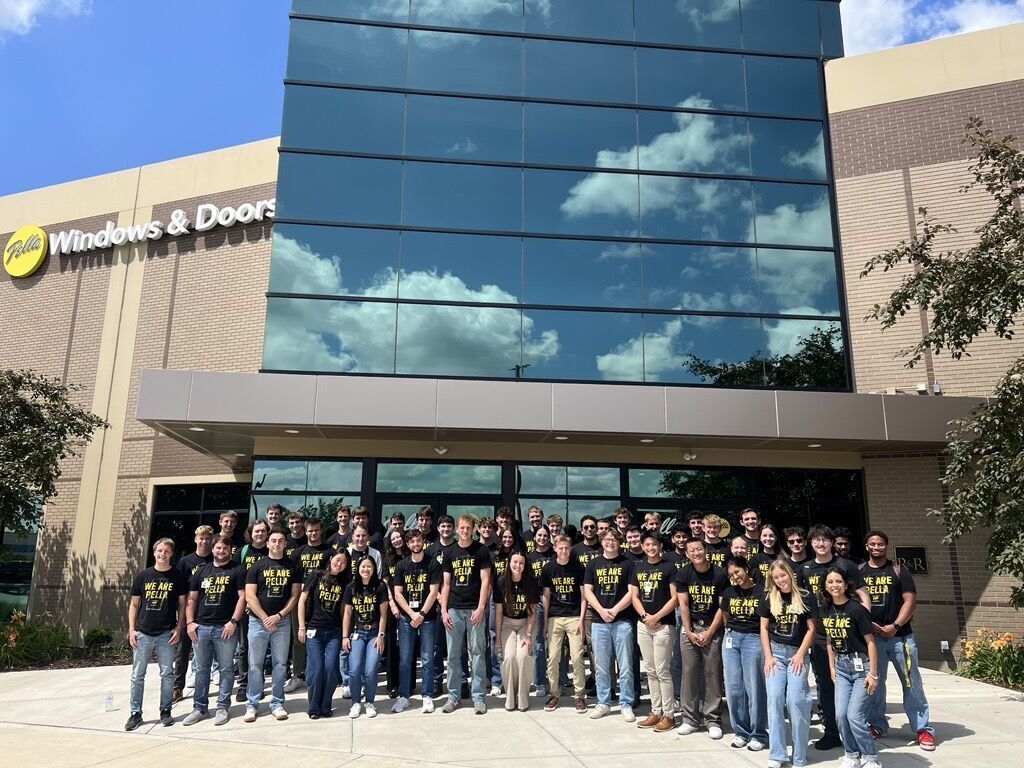
What projects have you worked on throughout your internship?
I worked on several exciting and impactful projects. My main focus was Kubernetes, supporting reliable service deployments. Although I had prior experience with Docker, Kubernetes required a different approach to container orchestration. I spent my first two weeks learning how to deploy k0s, a lightweight Kubernetes distribution, and identifying best practices for scalability and reliability. This work helped Pella in preparing its infrastructure for future growth and reducing the risk of downtime for deployments at remote plants.
I also worked with Device42, an inventory management platform that tracks Pella’s servers and network devices across its on‐premise infrastructure. My role involved comparing Device42’s discovery jobs with the existing “Server Inventory” solution and assessing Device42’s ability to fully replace it based on the company’s needs. This work improved efficiency and accuracy in managing thousands of devices through automation.
Another highlight was helping design and build The Pella Internship Platform, a web app created with Next.js, MongoDB, and MinIO. Along with the other IT interns, I improved the process for interns to log engagement activities, which tied into awarding the internship scholarship. This project gave me valuable experience collaborating on a software team, reviewing code, and strengthening my skills with identity providers like Okta and deployment automation with Terraform.
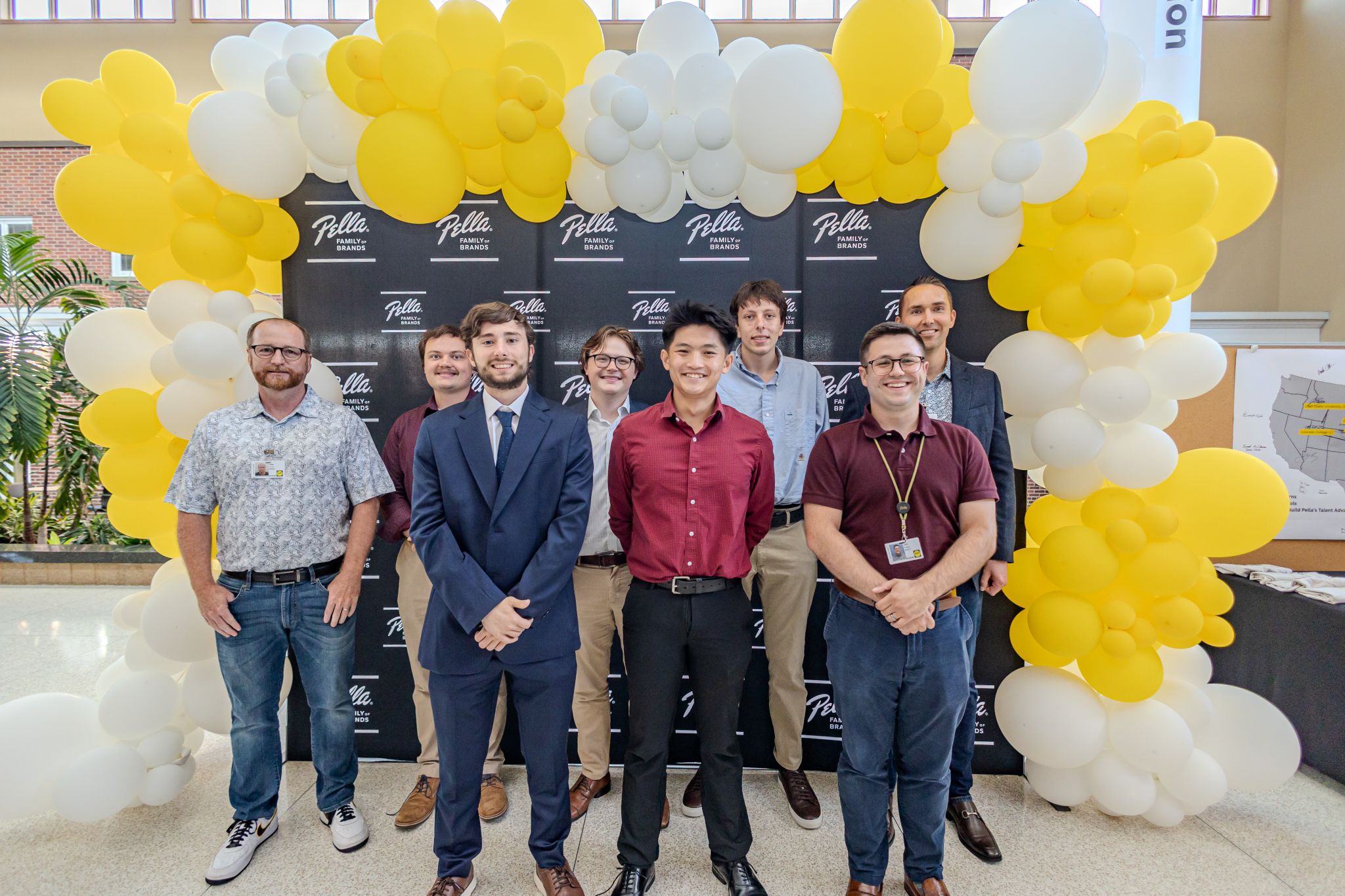
What skills did you develop or enhance during your time as an intern?
I strengthened both technical and soft skills. On the technical side, I expanded my understanding of container orchestration by moving beyond Docker and gaining hands‐on experience with Kubernetes and k0s in a production environment. I also grew my software development skills by working on the intern platform, participating in pair programming, conducting code reviews, and working with APIs for S3‐compatible storage through MinIO.
On the soft‐skills side, I improved my ability to present and communicate technical ideas clearly. I regularly gave updates in weekly stand‐ups and explained the “why” behind my work to stakeholders. I also delivered a virtual presentation on Microsoft Copilot’s effectiveness, participated in Pella’s intern case competition where my team pitched improvements to the trailer loading process, and concluded my internship by sharing my project outcomes with the entire IT department.
What was your favorite aspect of your internship?
Beyond the technical work, my favorite aspect was spending time with other interns. Living together made it easy to organize activities such as attending Thursdays in Pella, hiking and cliff jumping at Lake Red Rock, or playing pickleball at the Central College courts, so there was always something fun to do outside of work.
What tips do you have for current students seeking internships?
Go to the career fair prepared. Research the companies you’re interested in, understand the roles they’re offering, and be ready to explain not only what you’re looking for but also projects or experiences you’ve had outside the classroom. Technical recruiters can often help connect you with the right position.
Take advantage of alumni connections as well. Reaching out on LinkedIn or through your school can give you valuable advice, insights into the company, and sometimes even a stronger chance to stand out in the application process.
Interested about Pella? Read more about Allen's Pella summer internship experience.

Jaxson Gauthier
Major(s): Computer Science BE
Interned in Milan for the Start Up Tricky Leaf
Read More in Jaxson Gauthier's Internship Debrief...
I worked at a start up in Milan, Italy called Tricky Leaf that was known to be a software consulting company. This was a part of an overarching study abroad program that also included a internship seminar and Italian class.
What did a typical day look like the company you interned at Tricky Leaf?
I would get to the office around 8am on days that I did not have class and at 12pm on days that I did. We would have an all-team meeting at the very beginning, so everyone knew what's the goals were for the day. I would work until 1pm where would all go to lunch. It was a small start-up company of only 4 full-time workers so we would all sit at the same table and eat together. I would then leave the office around 6 with the other intern on the job and we would take public transportation back to our apartment. The work I did was full-stack software engineering mixed with other small projects scattered throughout the summer. I worked with back-end databases to hold customer information while creating a scheduling system for skiing lessons. I presented this information on both a web application as well as mobile using React and JavaScript. (Jackson is on the right, below.)
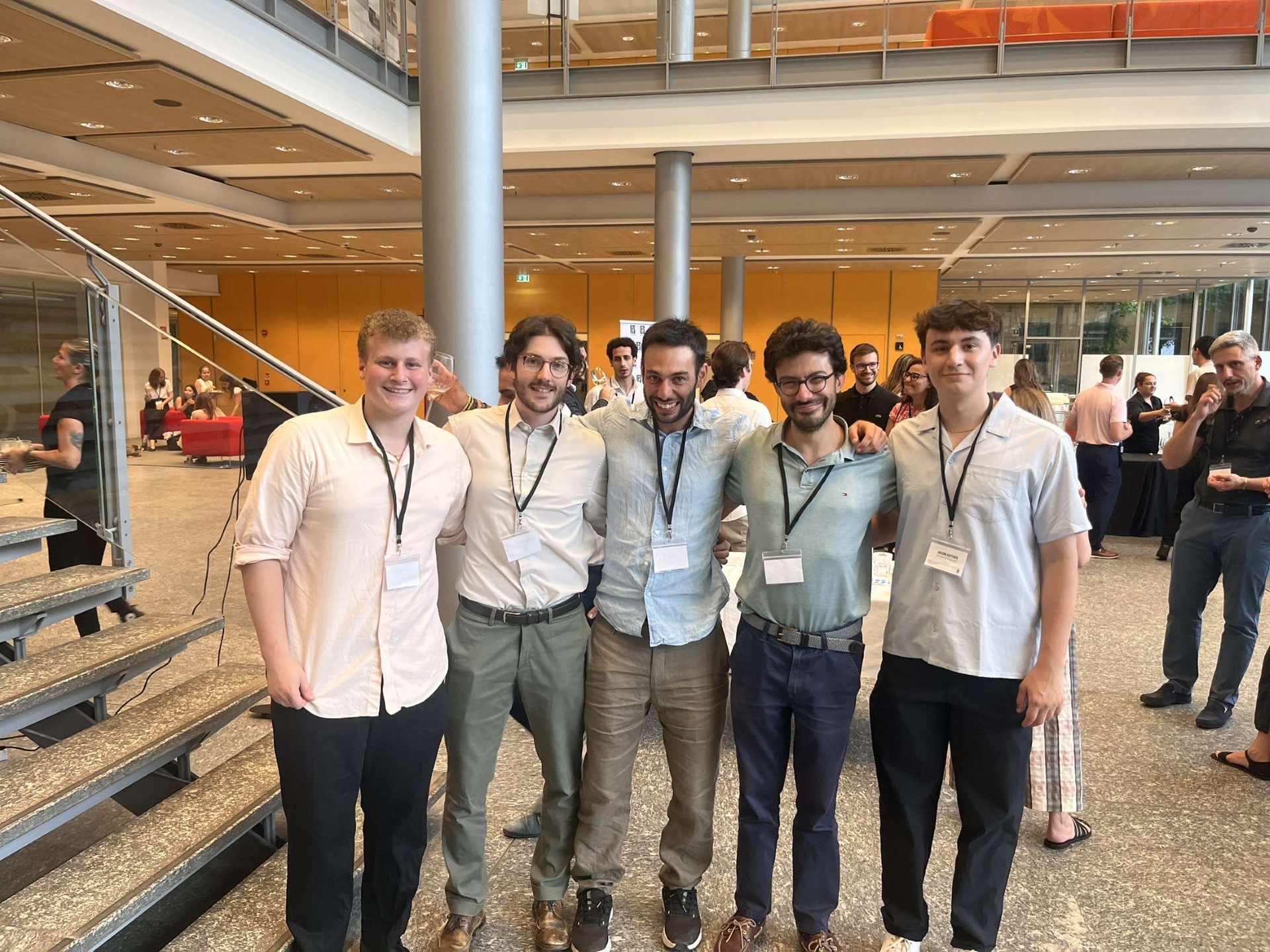
What projects have you worked on throughout your internship?
I worked on two main projects for the company and then two personal projects that they scheduled time for me to work on. I worked on a skiing lesson scheduler app that held information about the teachers as well as the users with a role-based security system that was based on the user's purpose in the application. I also worked on a IoT project that used automatic image detection to publish gate-lock status as well as a light-control system so a user could control all lights in the building through a web application. As for personal projects I created a personal website to display my journey and projects I've worked on. I also created a little Fourier Transform music game where the user has to guess songs based on an increasing number of frequencies.
What skills did you develop or enhance during your time as an intern?
Besides gaining coding skills through experience I was also able to gain project management skills since we had a lot of control over the things we were working on. Having a whole project fit into one vscode window was stressful at first but understanding the purpose of everything and where the project was in its life cycle made it easier to focus on what was in my control. The fact we had a meeting before all workdays made it easier to grasp where in the cycle we were. I also gained skills on professional networking through the program I was an apart of. We had multiple experiences where we would talk to different companies across all industries to practice communicating in a professional setting.
What was your favorite aspect of your internship?
My favorite aspect about the internship was that because it was a small company based in Milan, the work I did made a big difference, and I got to see that almost every day. At the beginning of the summer, the first project I got was very on the rails with directions laid out about all the steps I had to follow. At the end all they said was build this project and I got to work on it from the ground up. Being able to see that project start from nothing to being something they are currently implementing was really rewarding. It was also great to have my bosses just 4 feet away from me at all times in case I had any questions. Made it very easy to get back on the rails whenever I felt lost.
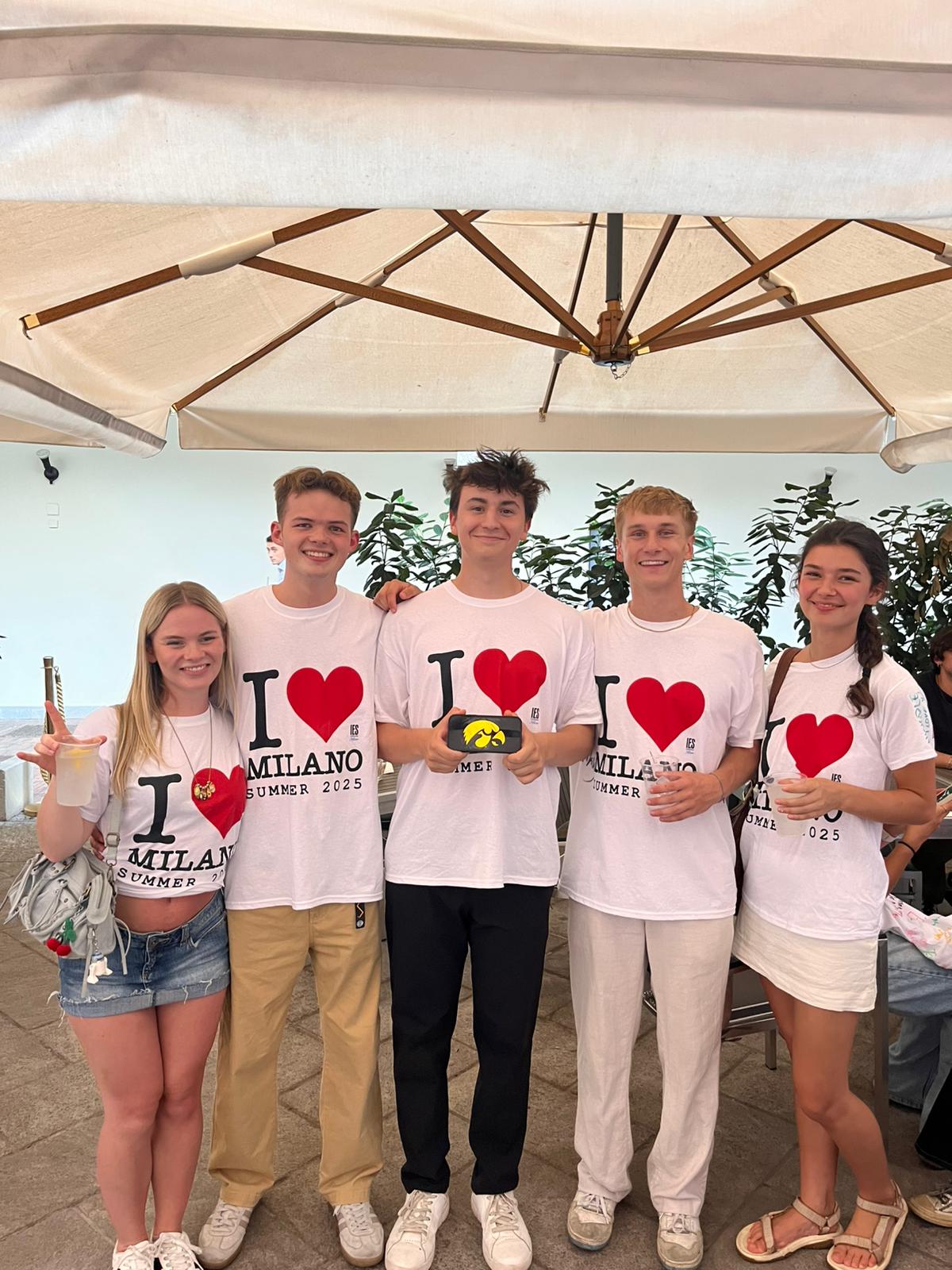
What tips do you have for current students seeking internships?
I would recommend everybody to embrace unique opportunities that may not have been your original plan. You learn the most from experiences you have no knowledge in beforehand, and those experiences come from unique opportunities. Apply for all the opportunities even if they seem they seem scary or unknown because you will learn a lot from it and gain something to take with you throughout your life.
What you drew you to Milan? Or was the location picked for you?
As far as the location, I originally applied for the London location and got it but they eventually reached out saying it was hard to place computer science/engineering majors in the location, so they offered 3 other locations being Italy, Australia, and Chile. I chose the Italian location because of its location in Europe and the various company opportunities within the city. They then matched me with a company that I interviewed with.
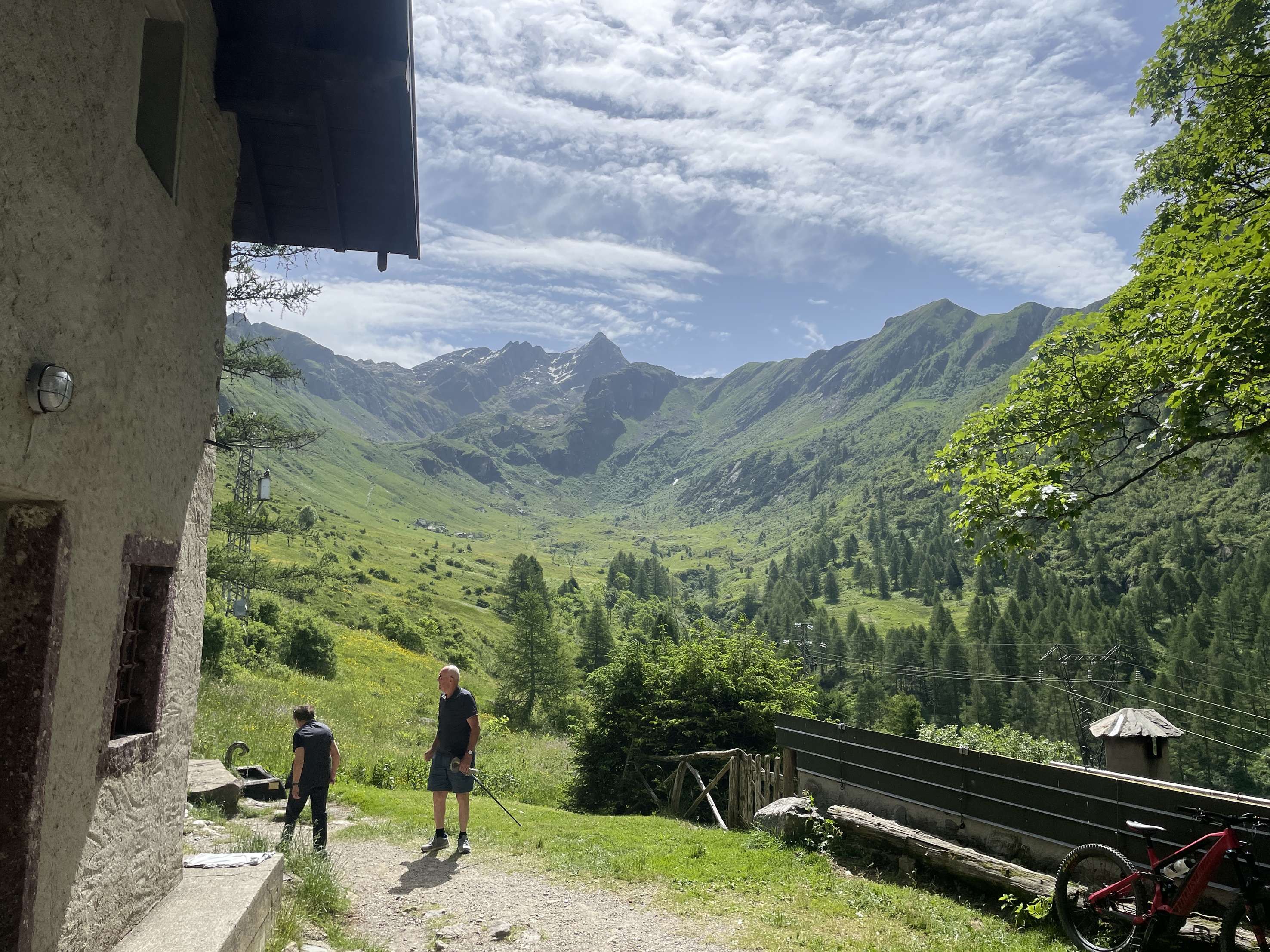
Any favorite moments in Milan?
Some of my favorite moments were when we got to travel up north to the Italian alps for a weekend that the program put together for us. We traveled often but this one was great because we got to stay in the country and stay in a cabin in the alps. Attached is a picture of where we stayed. I also really enjoyed my last week when my bosses took us wakeboarding and grilling for our last day on the job. I also really enjoyed running in Milan, we stayed on the border of the city where I was 15 minutes from the duomo but also 15 minutes from the countryside. I got to run in the fields of Italy during the evening and it was always so gorgeous.
What advice would you give students who are interested in pursuing a study abroad?
My advice for students who want to go abroad is that it's a lot easier than you think. I thought it wouldn't be an opportunity for me even at the beginning of last year but a simple application and a discussion with an advisor made it very clear that it was very much an option for me. There was someone who helped me the entire process leading up to when I left so I was never lost in the process. It's also a great opportunity to try something new, grow a lot of soft skills you can't learn in a regular classroom or internship, and meet a lot of people you wouldn't otherwise.

Veetreg Nahar
Major(s): MCS
Interned at CRST-The Transportation Solution
Read More in Veetreg Nahar's Internship Debrief...
What did a typical day look like as a Software Engineering Intern at CRST - The Transportation Solution?
[Over the summer] when I was full-time, I logged in around 8 a.m. and then I looked at emails and reviewed notifications about any updated statuses I had. At 8:30, I would go to a stand-up meeting where we would have to give progress reports of what we accomplished the day before and what we were going do that day. After stand-up meetings, for the rest of the day, I would work on my projects. I also met with my mentor and manager on a day-to-day basis, just to give updates on how I was doing with my work. Every Tuesday we would also have developer meetings, so all the software engineers would meet in teams to discuss what we were going to build next, how we were going to build those things, and what good practices we could follow throughout the development process.
I also participated in intern events, like game night and bowling night. When I was full time, we had wellness activities every Thursday where they would teach us yoga and different kind of things about how to maintain a proper work-life balance. We also had "Lunch and Learn" sessions where I was able to eat lunch with the heads of departments and upper management.
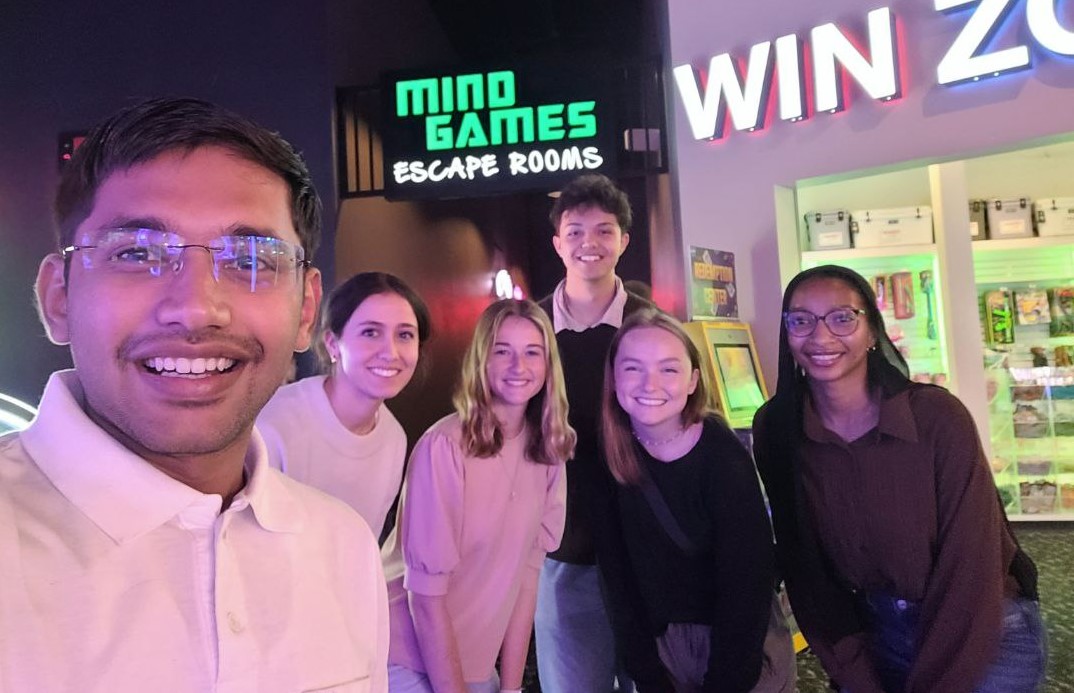
What does CRST - The Transportation Solution do?
CRST is one of the biggest transportation companies in the U.S. They provide all kinds of services in transportation, and work with some big customers like Walmart, Amazon, and NASA to deliver their equipment and loads. Along with that, CRST started a new home delivery service around the time of the pandemic. For example, if someone like you or me ordered a television or other item from Amazon, Amazon would contact CRST, and CRST would take that item from an Amazon warehouse and deliver it to your front door. On top of delivery, they can also install the equipment they deliver.
What drew you to wanting to intern with CRST?
There were a couple of things that drew my attention towards CRST. The first was the technology they use with their IT team, [which includes] Flutter, Dart, and Java. I’m very fond of these applications. When I met my manager at a university career fair, I was able to learn about the work CRST is doing and the technologies they are using, which interested me. Along with that, I found a couple of people who had worked at CRST before my internship started. They always had good things to say about the company culture and other people working there, which I found to be true.
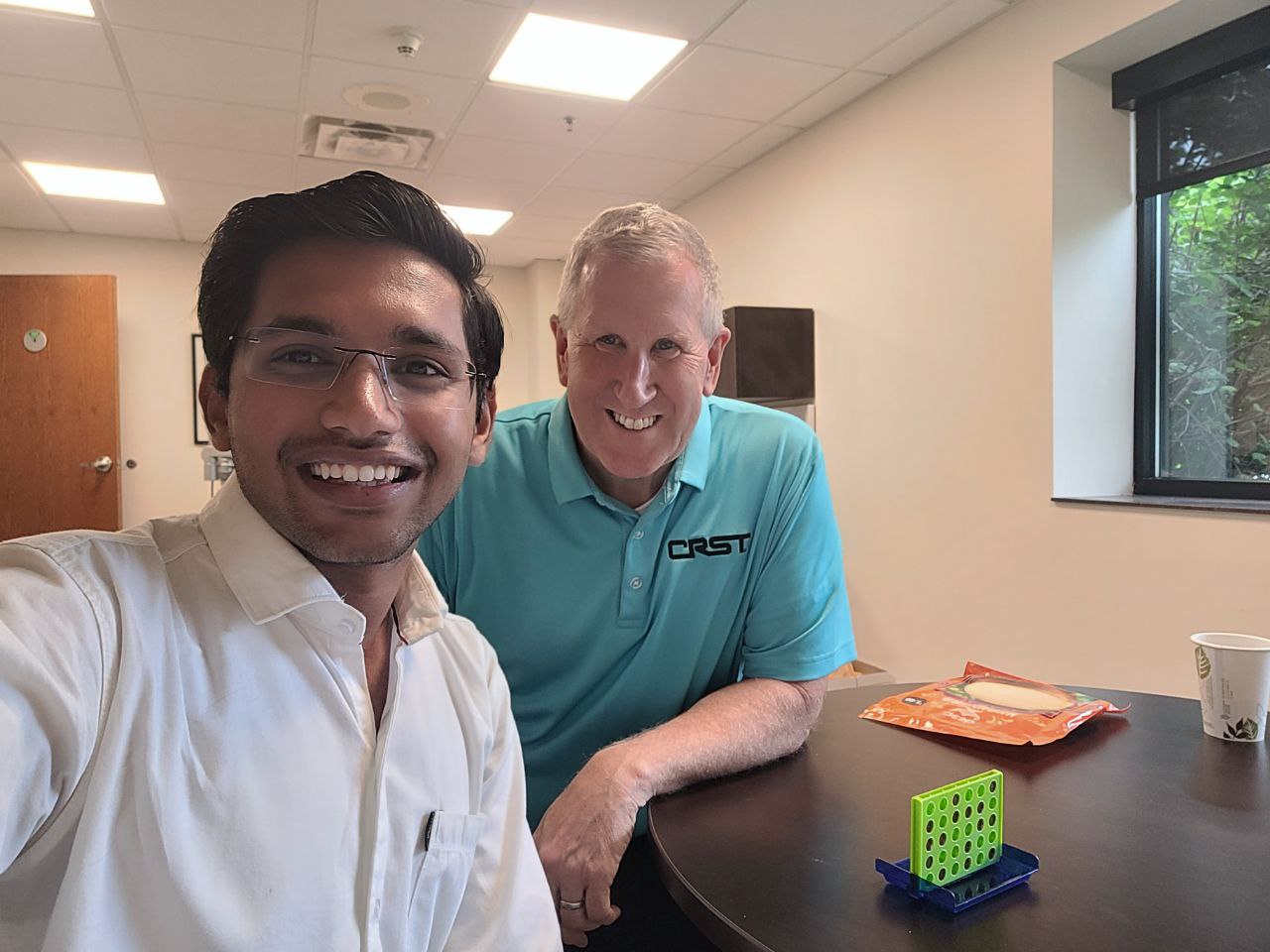
How did you secure multiple internships within the same company?
I was offered another position after my first internship ended in August. I ended on a Friday and started the position I’m in now on the following Monday. It’s been continuous work, but it is technically considered a new position for documentation purposes. The role is the same, but the status is different. In the summer, I was a full-time intern, but now, I'm part-time.
One of the main reasons why I stayed was because of the people. My mentor and manager treated me very well and taught me so much. When I first started working with CRST, I was new to mobile application development and only had experience with web applications. I ended up really liking the work I was doing and the people I was doing it with. Everything went very smoothly the first time around, so I thought it would be good to join them again and learn more.
How would you describe the culture of CRST?
People are so friendly and supportive over there. I was new to mobile application development, but by the end of my internship, I learned how to develop a mobile application. Everyone encouraged me to learn new things. The work-life balance is pretty good too. They don’t expect you to work after your working hours and if you struggle with anything, you can connect directly with your mentor or manager, and they usually make time in their schedule to help you.
What projects have you worked on throughout your internship?
In two and a half months, I delivered some big features for their mobile application, which is currently available on Google Play and the Apple App Store. During my summer internship and the first few weeks of this second internship, I helped launched a new inbox feature for their app so that CRST employees on the road can easily connect with their manager or the company’s office if they need anything. The app already had a function to chat, but it was only available for tablets, which would be installed in their truck. With this new feature, if a driver is away from their vehicle, they can chat directly with their manager and respond to messages conveniently from their phone.
Another in-app function we developed was a poll and survey feature. If CRST wants to design a new policy for drivers and wants to collect feedback, the drivers can respond in the app.
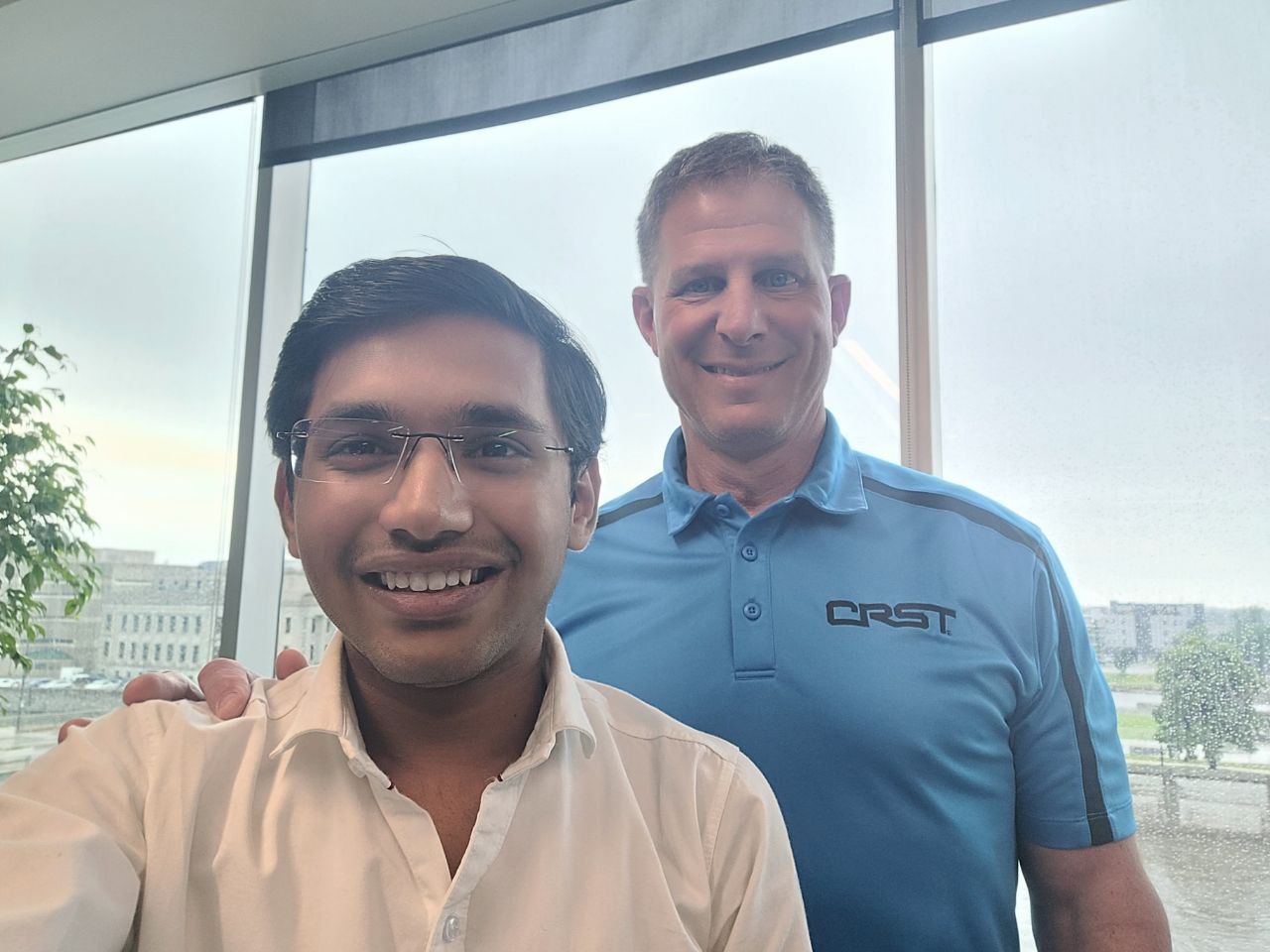
I also developed a notification announcement feature. For example, suppose you want to let a driver know that there’s a weather warning in Iowa. I programmed it so that if a driver is in Iowa, they can get that notification, and keep it mind as they drive. It can also be used to alert people when they get their paycheck.
I also worked on creating a database for keeping operational and HR documents online, because drivers may need access to those materials daily. Now they don’t have to worry about keeping a hard copy on hand and can access it through the CRST [app].
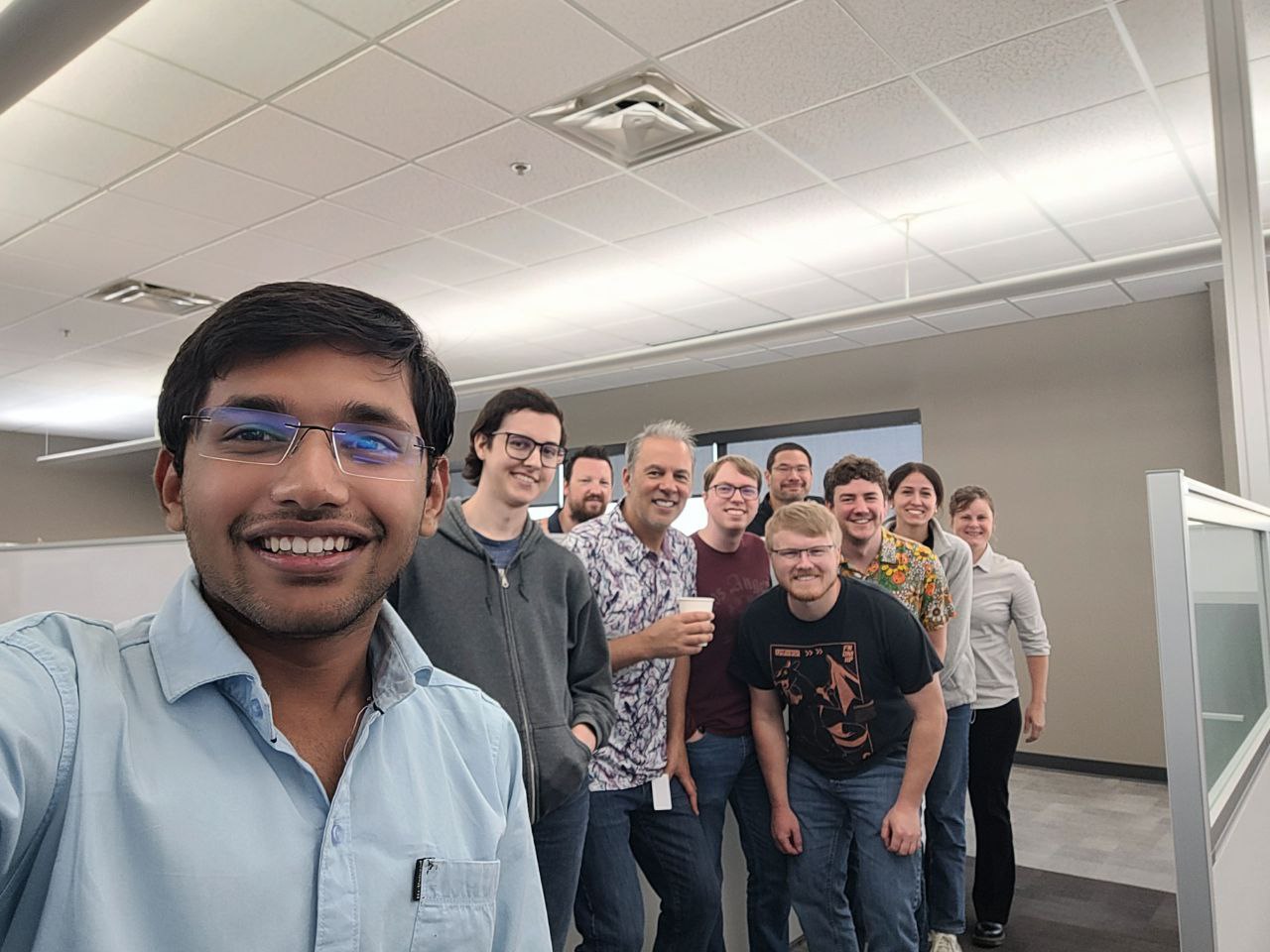
What tips do you have for current students seeking internships?
- Make sure your resume is clear about what you want to pursue. It should give recruiters an idea that you are looking to learn something, but that in the past, you delivered results. Don’t forget to include numbers in your resume and to tailor it to the job description.
- Once you have prepared a good resume, start looking at available openings. There are a couple of ways you can look for internships, but I got my internship through the university career fair. However, before then, I would message University of Iowa alumni to see if there were any potential opportunities in their companies. I would recommend LinkedIn and Indeed as good platforms for looking for jobs.
- Once you schedule an interview, prepare for it. In software engineering, most questions are about coding. For technical questions, you should look at the job description. Interviewers always ask a couple of situational questions, like "tell me about a time when you worked in a team setting" and "how do you handle time conflicts?". Use the STAR method when answering questions.
I’m grateful for the Pomerantz Career Center, University Career Fair, and the people in the Department of Computer Science who helped me prepare for this role. I also want to thank my manager, Grant, and my mentor, Johanna, for making this internship an enjoyable and successful experience.

Nathan Jankowski
Major(s): 4th Year - Computer Science BS & Economics BS
Intern at Discover Financial Services
Read More in Nathan Jankowski's Internship Debrief...
What did a typical day look like as a Data and Analytics Intern at Discover Financial Services?
My position was basically a software development role. I would commute an hour to work and then my day would start with greeting my fellow interns in our assigned section. After checking and responding to emails and the team’s chat, I would start preparing to get work done. I had two projects throughout the internship, which were both related to tech debt. I would usually work on those for a few hours and then we would have our daily scrum meeting, which would last around 15 to 30 minutes. In scrum meetings, everyone discusses their progress, any issues they’re facing, and announcements before returning to work for the rest of day.
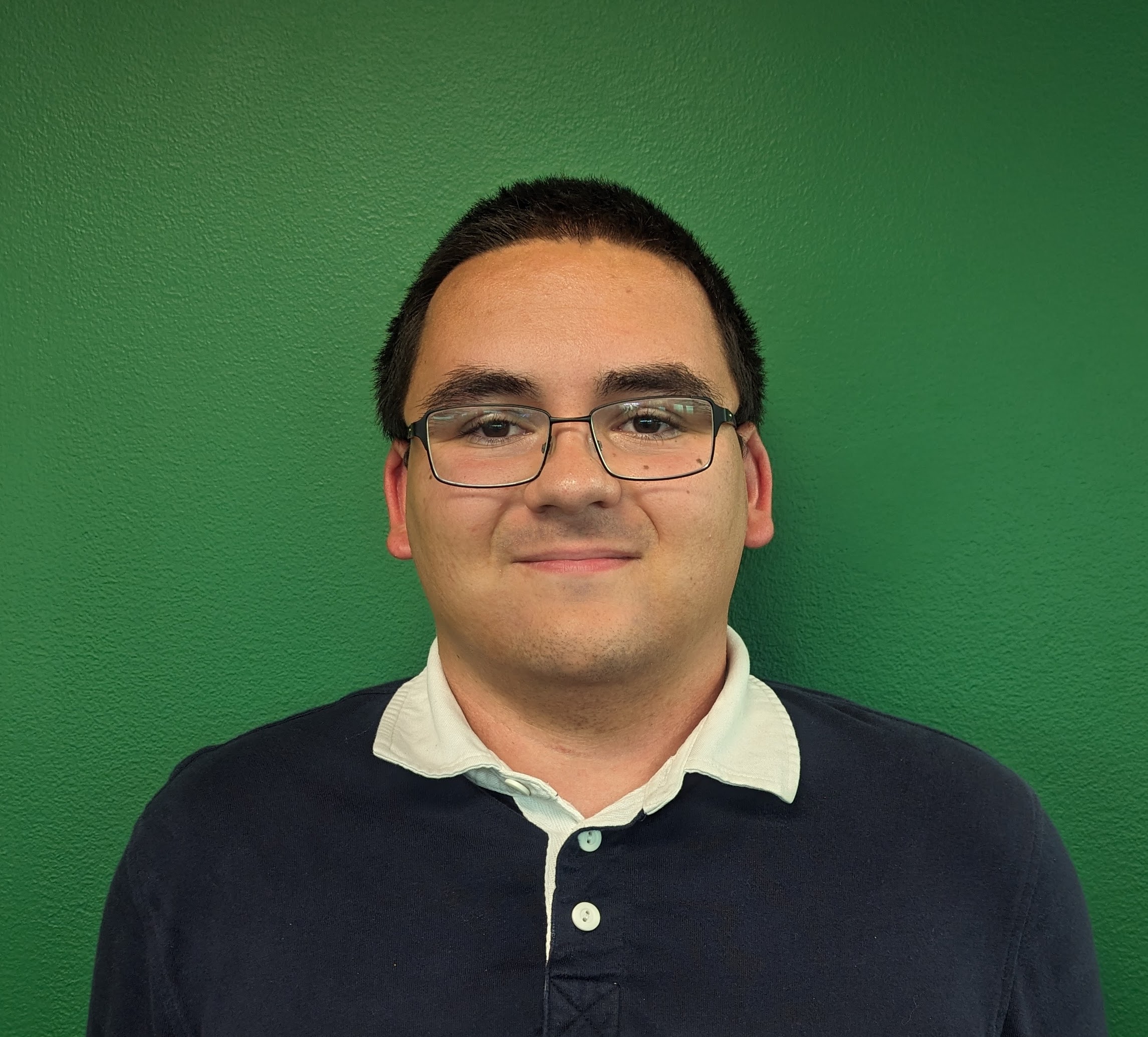
There were also several events scattered throughout my internship. Some were mandatory for interns, but others were optional and open to anyone within the company. In mid-July we were all treated to food and music aboard the Spirit of Chicago, and we sailed around Navy Pier. I also attended a presentation on financial literacy and a couple of other activities too.
What was your favorite event hosted by Discover?
Discover uses an anagram, and they use the “V” in their name to stand for volunteering. I don’t remember the name of the nonprofit, but I enjoyed participating in this volunteer outing where we packed backpacks for less fortunate children in the Chicago area. It was a good way to help the community, and it gave me a chance to talk with some other people at the company.
What were the two projects you worked on during your internship?
I worked on machine learning explainability models, which, for banks, can be used to make very important decisions related to determining whether people get approved for loans or credit cards. Both Discover’s data analysts and regulators need to know why these decisions are being made the way they are — especially regulators — so that we can prove Discover is not discriminating against applicants.
My work was largely focused on a JSON file and being able to run that file through the software we were developing to generate model reason codes. These model reason codes would give a reason as to why a specific decision was made. My job focused on making sure the file was validated properly and that it was formatted correctly to ensure that it was not going to cause an error down the line that could potentially either break the software (which would be a good outcome) or poison the system entirely (which would be the bad outcome). The second project I worked on was building a command tool to help automate the validation process, so now, people can type in one command, give it all their files, and the program will validate everything for them.
How did you seek and obtain this internship?
I never thought that when the university had me make a Handshake profile it would actually come back to pay dividends. I was surprised when a Discover recruiter reached out to me during my sophomore year. I applied, interviewed, and then attended this one-day event in downtown Chicago the summer between my sophomore and junior year, where I got to get an overview of the company and its culture. Everybody who attended got early access to the application for the following summer’s internship. I applied for the data and analytics position, went through two rounds of interviews, and the rest is history.
Two things drew me to this opportunity:
- Fintech (financial technology) is right up my alley as someone who is double majoring in computer science and economics. I knew this was an internship where I would be able to learn about machine learning, which is a field I want to pursue in the long-term.
- Discover has a very strong company culture. It's a very welcoming space that’s open to new ideas and there are a lot of really good people working there. Once I started my internship, I felt like I was included and being heard. I also felt like I was doing work that actually meant something and was helping other people.
What skills did you develop or enhance during your time as an intern?
I was able to learn technical skills that my computer science education does not necessarily provide. I didn't know what a JSON file was until I came into this internship, and I left with a pretty good understanding of them. Test cases are also something that are kind of touched on in courses here, but not that much. In my internship, writing test cases to prove that my code actually worked as I say it did was about half of my job.
However, I think the bigger picture is that I also got better at collaborating with other people in my team, especially people who are much more skilled than I am. Standing up and advocating for myself in terms of asking lots of questions and seeking out feedback was also a very important part of me growing professionally.
What tips do you have for current students seeking internships?
My biggest tip is to show your humanity. If the company wanted to hire a robot or an AI, they wouldn’t have put up the job offer in the first place. They put up that job offer because they want to hire a human, so show that you're a person with interests who will be fun to work with and who can make people laugh. Talk about how your interests outside of CS contribute to you being a better worker. During one internship interview, we ended up on the subject of a research project I did for a gen-ed in Russian culture, and the interviewer liked what I said so much that they ended up contacting me after that interview on their personal account, asking if I would send them the presentation I did for that class. A lot of CS majors are told to just grind 100 applications, but I would say remember that employers don’t want a robot, they want a human
Can you see yourself in a future career with Discover Financial Services?
Yes! It’s already going to be a long-term career for me. I received a return offer around the beginning of the semester. After I graduate this spring, I will be starting in what is essentially a rotational program. All the new hires rotate around the different departments for a few months at a time for roughly two years or so before they specialize into one department. This process makes sure that people go into something they want to do and where they can be the most productive and excited.
Congratulations! After having this internship experience and becoming more familiar with Discover Financial Services, what are you most looking forward to in this full-time position?
I’m looking forward to learning more about the technology and the company. Hopefully when I go back there, I'll be able to learn where my code from this summer ended up. I’m also interested in the new challenges we’re going to be facing, especially right now with the merger with Capital One. I know the merger is a big topic of concern for some employees, but I think it will be a really good challenge. Discover is also starting to work more towards integrating artificial intelligence into its workflow, so I’m curious to see how we will experiment with it in ways that will keep private data confidential.
Vincent Cai
Major(s): MCS & PhD in Composition
Interned as a Software Engineer at Casey's
Read More in Vincent Cai's Internship Debrief
What did a typical day look like as a software engineering intern at Casey's?
During my internship, I started each day by participating in daily standups as part of SCRUM ceremonies. Also, like other teams, our team had daily meetings depending on the day, and worked on things like sprint planning, backlog refinement, and sprint retrospectives. Initially, I observed and listened to what other engineers were doing, but as I gained experience, I began contributing to the stories and actively participating. In the first half of my internship, I shadowed my mentor whenever I had free time. He taught me a lot beyond just technical skills, emphasizing that understanding business models is crucial to understanding software.
How did you seek and obtain this internship?
I got this internship from the 2023 All Majors Career Fair.
My friend had previously interned at Casey's, and he highly recommended the internship program to me.
What skills did you develop or enhance during your time as an intern?
I learned the importance of having strong soft skills. The commercial applications were large and complex, and I couldn’t do anything without help. It was crucial to have people willing to assist because I couldn’t complete any user story without someone demonstrating it at least once from start to finish. I learned not only from my mentor but from all the engineers in our team, and now know which areas I should spend more time on.
What was your favorite aspect of your internship?
Casey’s internship program includes an Executive Speaker Series, where the company’s C-suite (CEO, CIO, CFO, COO, etc.) give talks about their experiences. Interns can interact with them and ask questions. I think this is very helpful.
What tips do you have for current students seeking internships?
- Dress and behave professionally.
- Continue applying regularly until you get an internship. Don’t be discouraged when receiving rejection.
- If you get one offer and they ask you to respond immediately, go ahead and secure the offer.
Can you see yourself in a future career at Casey's?
I am willing to work for Casey’s if they can provide visa sponsorship, as I am an international student.

Liao Zhu
Major(s): 4th Year - Computer Science BS & Mathematics BS
Intern at Columbia in Amazon's SURE Program
Read More in Liao Zhu's Internship Debrief...
What did a typical day look like as a researcher at Columbia in the Amazon SURE program?
It’s not your classic 9-5 job. Some days I would be in the lab for 10 hours — working at home for another 2-3 — while others I would be in the lab for 5. It really depended on how fast you can work and your workload. After lab, I would spend the rest of the day either doing hobbies or exploring the city with friends from the program.
Could you please explain your research for a lay audience?
I worked in the Wireless and Mobile Networking Lab, focusing on two key areas:
- How weather affects 5G signals, analyzing how things like rain or even dense cloud formations impact network performance.
- Spectrum management in densely populated urban environments like New York City, developing strategies to efficiently share and manage wireless frequencies in areas with heavy signal traffic.
My research lab was assigned; however, my research topics were self-selected. The reason I researched the areas I did was due to their extension from my current research here at the University of Iowa, focusing on data analysis and machine learning.
How did you seek and obtain this internship?
I actually had an offer from a separate company for Summer 2024; however, I was curious about what full-time research would be like and, after discussing it with my research professor here, I decided to give it a try and applied to a few schools. The application process was very standard: resume, statement of purpose, and two to three letters of recommendations. Columbia University was one of the schools that got back to me and when I looked at a few of their research areas I decided to give it a try.
What skills did you develop or enhance during your time as an intern?
The biggest was time management, as there were many times I would be swamped with various projects going on at once. I learned how to manage my time efficiently so that I could benefit my lab and also have enough time to do the things I enjoy.
How do you expect this experience to help with your remaining semesters at Iowa?
As a fourth year, I’ve started taking more math-heavy machine learning courses. Though I never did any real math during my experience, just knowing more about machine learning as a whole will better prepare me for these courses.
What was your favorite aspect of your internship?
My favorite aspect of researching was proving a claim we made through code. It’s a straightforward process but knowing that our logic held up and that the data supported our theory was the part I enjoyed the most.
However, if you were to ask me about my favorite aspect of my time as a whole, it would be exploring NYC with my friends. I met a lot of really cool people from the program, but there were also a lot of people from the University of Iowa that had internships in NYC. We would spend our free time doing things like museums, tourist attractions, and poker.
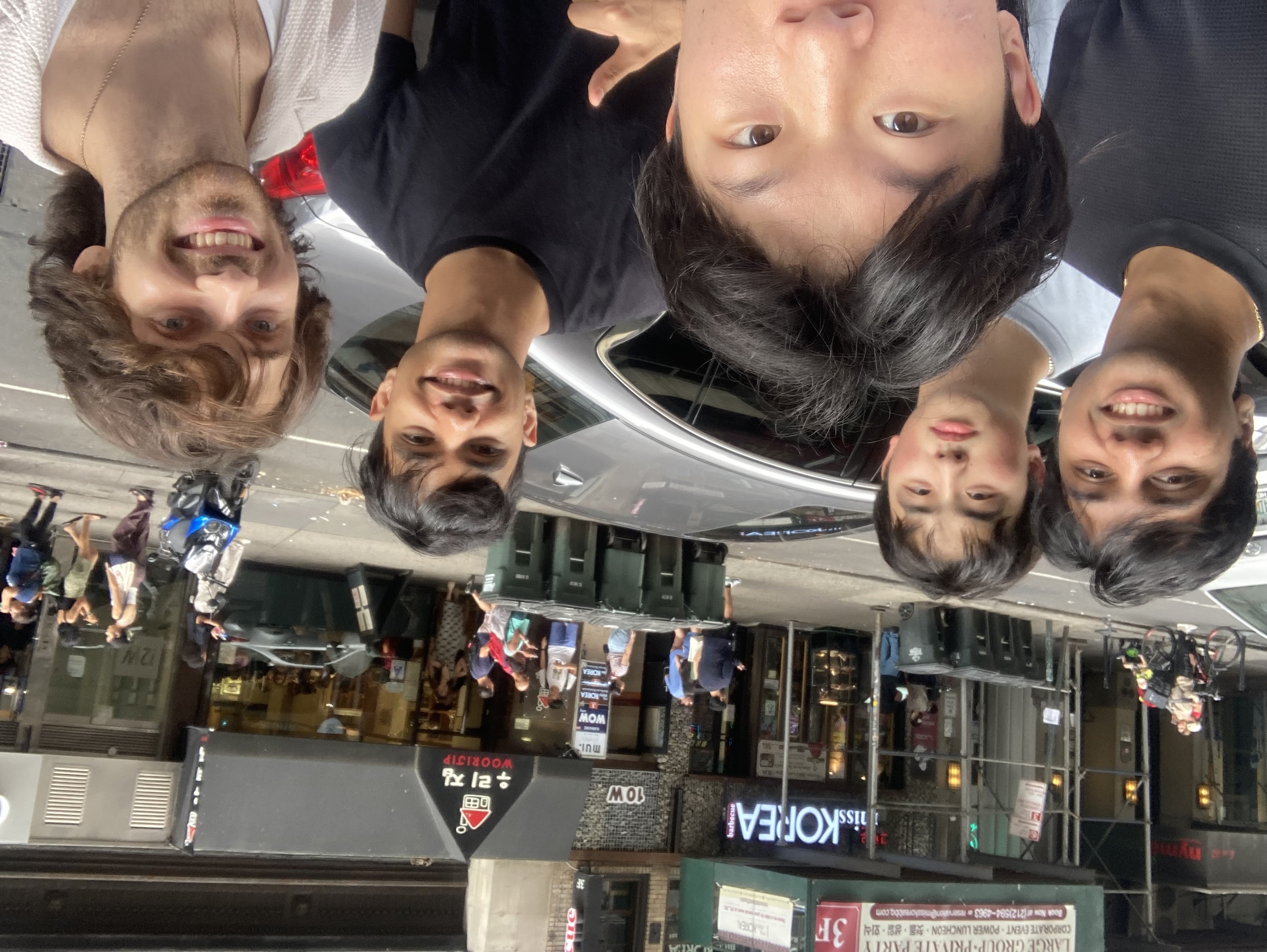
You mentioned you were curious about what full-time research would be like. Can you see yourself engaging in full-time research post-graduation or as a career?
I could definitely see myself pursuing research full-time; however, I'm still figuring out if that's something I actually want to pursue in the future.

Liz Elias
Major(s): 4th Year - Computer Science BA & Microbiology BS
Intern for St. Jude's Pediatric Oncology Education (POE) Program
Read More in Liz Elias' Internship Debrief
What did a typical day look like as a Computational Intern for St. Jude's Pediatric Oncology Education (POE) program?
I usually started my day by blocking out 3-4 hours in the morning to really focus on the programming component of my project. My mentor, Dr. Balint Meszaros, was less of a morning person than I was, so I generally had some time alone in the mornings. We usually met up after I grabbed lunch and went to the intern seminar with the other POE interns. We'd then discuss what I'd completed during the day and set up a plan for what I'd be doing next.
How did you seek and obtain this internship?
I'd had experience in both experimental and computational research when I applied but hadn't had a chance to work at the intersection of biomedical and computer science, which is what motivated me to look for an internship like this. One of my PIs at Iowa, Dr. Dawn Quelle, did her post-doc at St. Jude and so I just googled if St. Jude had a summer internship program which is where I found the POE program.
You mentioned you helped develop the project your internship focused on. Could you please elaborate on how you were able to do so?
During most REUs, undergrads will be given a branch of an already well-developed project to work on for the summer. All I got was an abstract. This meant I got to develop the project from the beginning and, with the help of Balint, developed the entire code base from start to finish and was making the decisions on what story we wanted to tell with this research.
What skills did you develop or enhance during your time as an intern?
I was able to develop a depth of knowledge regarding how computational tools and computer science theory can be used to advance our understanding of cancer biology and other genetic diseases. Also, because my lab had both wet and dry lab scientists, I was able to see how the data produced by computational scientists supports the dry lab scientists and vice versa. They're equally important to advancing cancer therapies and one cannot replace the other.
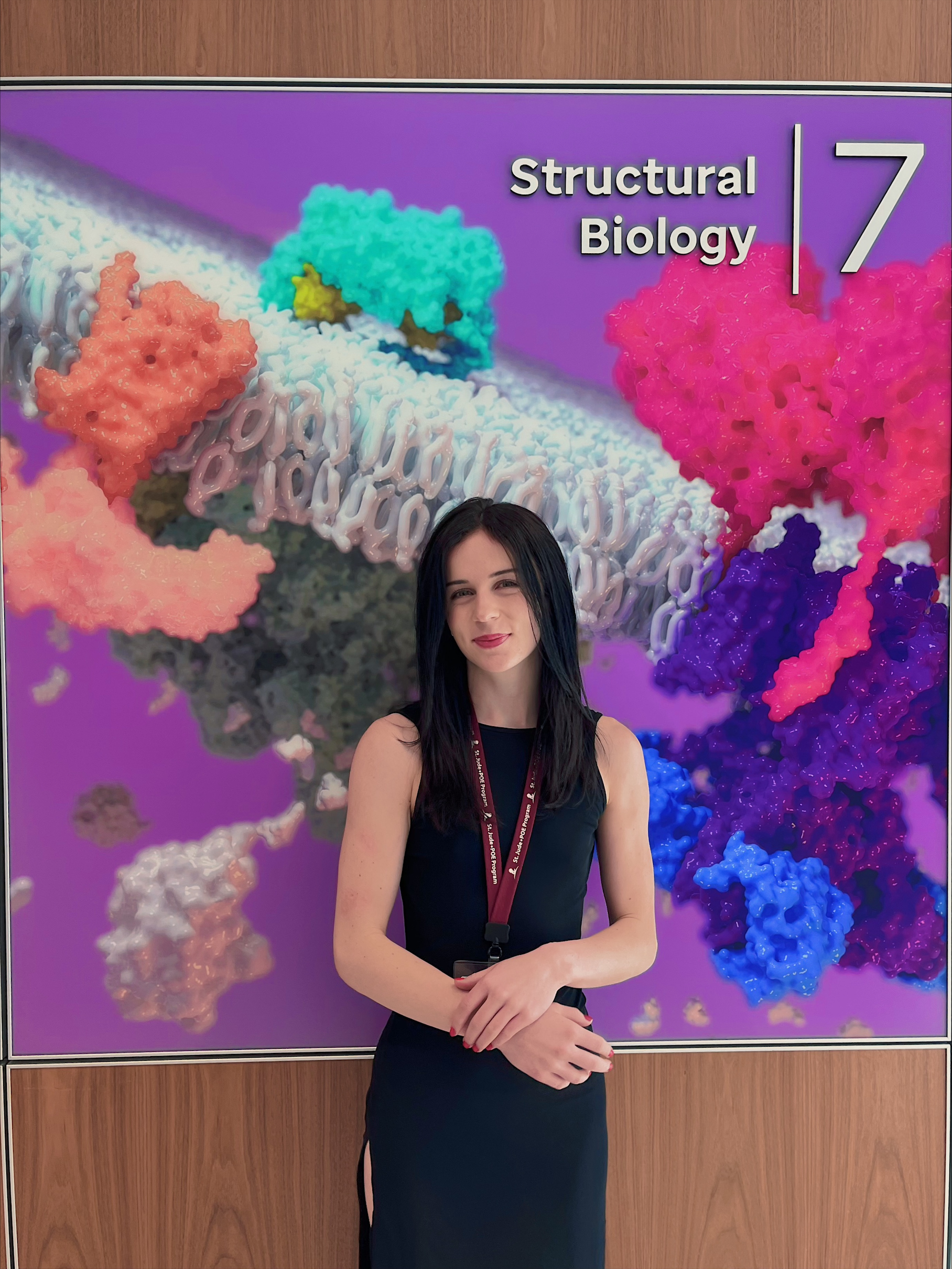
How do you expect this experience to help with your remaining semesters at Iowa?
This experience was a bunch of troubleshooting in python and working with a lot of large, complex datasets so I feel really prepared for my classes this semester that are using python. I also think that developing this project from the beginning gave me a lot of skills I can bring back to the research labs I'm a part of at Iowa.
What helpful tips do you have for current students seeking internships?
Start networking early and get to know faculty at Iowa working in the spaces you want to end up in. A highly personal letter of recommendation or the right connection can make a huge difference.
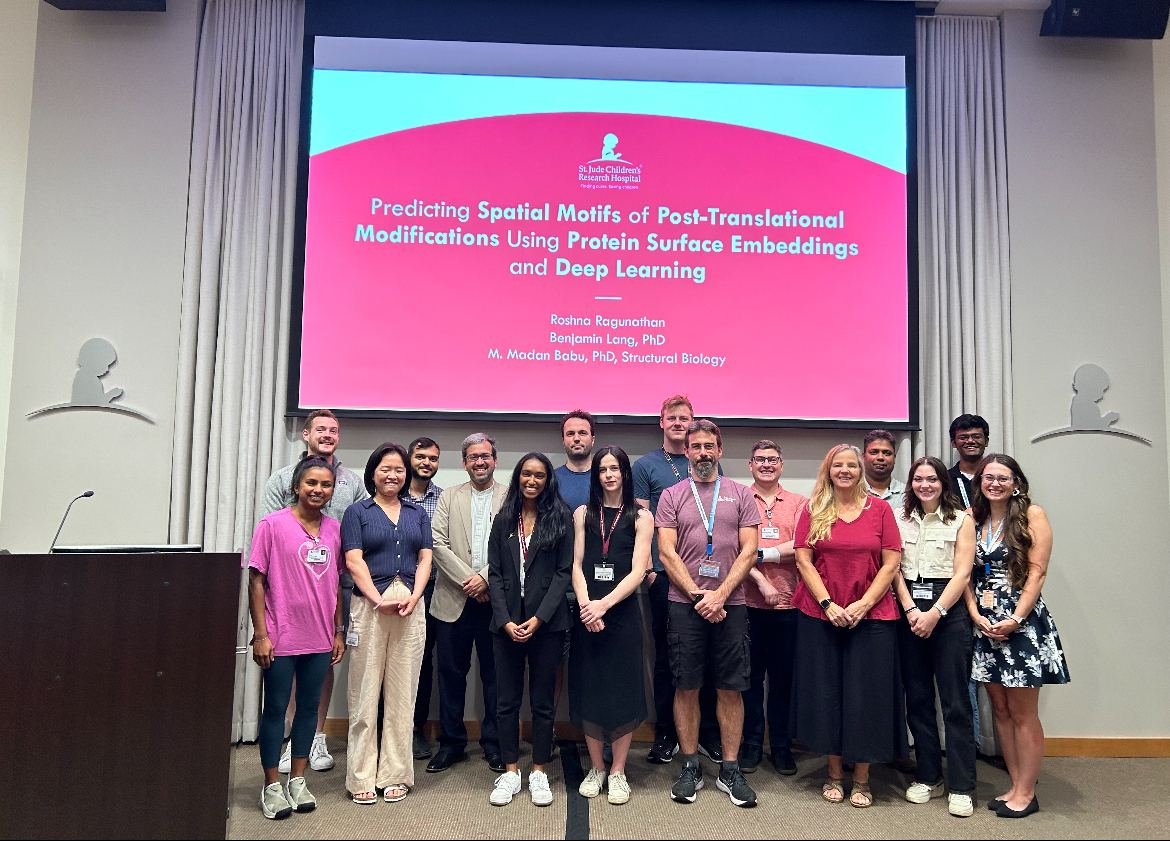
What was your favorite aspect of your internship?
The people. Dr. Babu, (the PI), has brought in scientists from across the globe. Not only were they incredibly smart and accomplished, but welcoming and excited to be doing the research they are doing and mentoring younger scientists. Balint was also an incredibly mentor. He was always willing to explain any concepts I needed for the project that I hadn't worked with before and was super encouraging even when I ran into problems.
Can you see yourself in a future career with St. Jude’s Babu Lab?
Absolutely! My mentor and PI have already mentioned that they would be more than happy to bring me back to St. Jude if I decide to do another summer with the POE program. I'm also continuing this project remotely so we can turn it into a publication, so I still haven't left yet even though I'm no longer in Memphis. St. Jude as an institution is truly inspiring as well and I'm so grateful I was able to contribute a small amount to developing better treatments for children with cancer.

Isabelle Paulsen
Major(s): 4th Year - Computer Science BS | U2G
Interned at Collins Aerospace
Read More in Isabelle Paulsen's Internship Debrief...
What did a typical day look like as a Software Engineer Intern at Collins Aerospace?
A typical day at my internship consisted of a daily scrum meeting at 10am with my team, where I got to hear what everyone else was working on, tell them what I am working on, and ask questions if necessary. I usually had one or two other meetings throughout the day with teammates, code reviewers, mentors, etc. My team consisted of people from all over the world, so I didn't keep to the usual work hours — sometimes our meetings were early mornings, sometimes late at night! I would spend the rest of my day coding. I went into the office twice a week but got to work from home the other three days.
As for what I worked on — I was on a team that is developing a web app to manage air traffic control for unmanned aircrafts. I analyzed a bunch of data that they collect, as well as worked on a "flight summary" page that includes data download capabilities.
The coolest thing I got to do was to go to a NASA research facility in California. Collins Aerospace and NASA are working together to improve simulated flight-testing capabilities, and we visited their team on a fact-finding mission. I learned a lot about what Collins does, what NASA does, and I even got to fly a simulated aircraft!
How did you seek and obtain this internship?
I obtained this internship at the engineering career fair last year. I talked to a recruiter, they offered me an interview the next day, and they offered me a position about a week later.
What skills did you develop or enhance during your time as an intern?
In my time as an intern, I improved both my soft and hard skills. I improved at networking, communication, professionalism, and time management. I also worked in the Angular framework — something I've never used before — and navigated my way through a massive software development project.
How do you expect this experience to help with your remaining semesters at Iowa?
As for my remaining semesters at Iowa, I feel much more confident in my coding abilities. I hope to take on more bigger projects. I also feel more excited about what my life will look like after college. I feel like I know why I am getting this degree, and I can see how I will apply it.
What helpful tips do you have for current students seeking internships?
Don't be afraid to introduce yourself! You never know where a connection will lead. It definitely feels a little embarrassing or awkward to try to network, but there's only one way to learn, and it will lead to something!
What was your favorite aspect of your internship?
My favorite aspect of my internship was my team. I really enjoyed all of the people I met. I got to make great connections, even though they live on another continent. I met so many inspiring, hardworking, encouraging people.
Can you see yourself in a future career with Collins/RTX or… NASA?
I really enjoyed the work that I did this summer, as well as my team, but I don't think aerospace is where my passion lies. I'll never say never to a future at Collins/NASA, but for now my options are open!
In addition to seeking a bachelor's and partaking in the Honors program, you are now an “Undergrad-to-Grad” (U2G) student: could you please speak to why you chose to add an extra year to your Iowa education?
As for U2G, it seemed too good to pass up. A master's degree in one less year is awesome, and I wanted to take the opportunity while I could.

Osama Khalid
Major(s): PhD - Computer Science
Intern in Software Engineering at Google
Read More in Osama Khalid's Internship Debrief...
What did a typical day look like as a Software Engineering Intern at Google?
I think my daily routine was quite typical of the tech industry in general. I would go to work at 9am, grab a coffee by 9:30, have a daily check-in with my intern host, work till 1pm, have lunch till 2, go back to work till 5. And after 5, completely disconnect from work, which is a luxury I can't afford in my regular grad life.
How did you navigate securing multiple internships within the same company?
For the first internship, I applied! (This is very critical, see response to question 4). And gave 2-3 tech interviews. After that I was assigned a recruiter and put in the team-matching pool. I wasn't particularly happy with the teams my recruiter was trying to match me to, so I started reaching out to various people at Google, whose work I liked to see if they were looking for interns. Once I got a positive response, that was it.
By the second internship, I was more familiar with the process, so it was easier, Additionally, because of my performance during the first internship, I didn't have to give the tech interviews. The rest of the process was the same as the first time.
How has your experience aided you since returning to study at the University of Iowa?
During my internship, I honed the tools and skillset that I have been using in my research work. This is not just limited to the technical skills I acquired, but also at a broader level, my understanding of the implication and impact of my work.
What skills did you develop or enhance during your time as an intern?
I think the most important skill I developed during both my internships was handling Natural Language Processing (NLP) problems at Google's scale. My research generally has focused on problems at a much smaller scale. Adapting my skillset to deal with problems at that scale was quite an interesting technical challenge.
What helpful tips do you have for current students seeking internships?
I think the most important thing to do is to apply. Personally, I think one of the main reasons I didn't interview for internships during the first couple of years of my PhD was that I was too caught up in the idea that the tech interviews are hard, complicated and require a lot of preparation and I should only apply once I am fully prepared. Yes! the interviews do require some preparation, and you can prepare as much as you want, but the preparation is of no use if you don't actually apply!
What was your favorite aspect of your internship?
I loved the free food. I am quite embarrassed to admit that I managed to gain quite a few pounds over the summer because of the amazing food they had. The Google campus in California is quite close to the Sierra Nevadas. I spent almost every weekend hiking through the mountains of California, trying to burn some of those extra pounds off.
Can you see yourself in a future career with Google?
Definitely. Even though I like academia, I think what I actually love is working on problems that have real-world impact. At least in NLP, the work being done in the industry at that scale is far more exciting for me.

Shihui Song
Major(s): PhD - Computer Science
Interned as a Research Aid at Argonne National Laboratory
Read More in Shihui Song's Internship Debrief...
What did a typical day look like as a Research Aid at Argonne National Laboratory?
As a Research Aid at Argonne National Laboratory, my typical day was quite dynamic. I primarily focused on researching Cerebras, an advanced AI chip. This involved a combination of tasks such as running simulations, conducting experiments, analyzing data, and collaborating with fellow researchers.
How did you navigate securing multiple internships within the same company?
Securing multiple internships at the same company, such as Argonne National Laboratory, requires effective communication, networking, and demonstrating consistent dedication to your work. I maintained open communication with my supervisors and expressed my strong interest in returning for another summer. I also kept my skills and knowledge up to date, which helped me prove my value to the team.
How has your experience aided you since returning to study at the University of Iowa?
My experience at Argonne National Laboratory has been incredibly valuable in my academic pursuits at the University of Iowa. I gained a deep understanding of cutting-edge technology in the field of AI chips and advanced computational methods. This has significantly enhanced my coursework and research capabilities, allowing me to apply real-world knowledge to my studies. Additionally, I developed effective time management, problem-solving, and communication skills during my internship, which have proven highly beneficial in my university studies.
What skills did you develop or enhance during your time as an intern?
During my internship at Argonne National Laboratory, I honed various technical and soft skills. Some of the skills I developed or enhanced include:
- Advanced Computational Skills: Working with a supercomputer helped me improve my computational skills for data analysis and simulations.
- Research Methodologies: I learned how to design, conduct, and document research experiments effectively.
- Data Analysis: I gained proficiency in processing and analyzing large datasets.
- Teamwork and Collaboration: I enhanced my ability to work in interdisciplinary teams and communicate complex ideas effectively.
- Time Management: Balancing research tasks, experiments, and analysis improved my time management skills.
- Critical Thinking: My work required me to think critically and solve complex problems efficiently.
What helpful tips do you have for current students seeking internships?
Begin your internship search well in advance to secure opportunities at top organizations. Tailor your resume to highlight relevant skills and experiences for the specific internship you're applying for. Practice answering common interview questions and be ready to discuss your skills and interests.
What was your favorite aspect of your internship?
One of the most rewarding aspects of my internship at Argonne National Laboratory was the opportunity to work on innovative AI chip technology and contribute to groundbreaking research. I also appreciated the collaborative and intellectually stimulating environment, where I could exchange ideas with accomplished researchers. This made every day exciting and fulfilling.
Can you see yourself in a future career with Argonne National Laboratory?
The experiences and knowledge I've gained during my internships have deepened my interest in the work they do. Argonne's commitment to cutting-edge research aligns with my long-term career goals, and I hope to contribute to their ongoing advancements in the field. I look forward to exploring opportunities for continued collaboration with Argonne National Laboratory.

Benjamin Wilson-Langman
Major(s): 4th Year - Data Science
Interned as a Sotware Engineer for Walmart Global Tech
Read More in Benjamin Wilson-Langman's Internship Debrief...
What did a typical day look like as a Software Engineer Intern at Walmart?
My average day began at around 9am: I'd grab a coffee from the lobby or cafeteria, get settled at my desk, and catch up on emails and team chats until standup at around 9:45. If you're unfamiliar; "standup" is a short meeting, 15 minutes for my team, in which we'd share the progress we made in the last workday and get any input we needed from teammates. After that, the day was pretty unstructured. Generally, I'd work on my given task or project for a few hours, occasionally discussing problems I'd run into with a senior developer, and then grab lunch for about an hour in the early afternoon. After that, sometimes I'd have an intern event, and then it was right back to meetings or my task. I'd generally be done for the day at around 4pm, which gave me plenty of time to pursue errands or recreational activities for the rest of the day.
How did you navigate securing this internship?
After applying mid-Fall, I had three separate interviews before receiving an offer. The first interview, behavioral, was mostly simple problem-solving and psych questions to give the recruiter a basic understanding of myself. I then had a take-home coding test, in which I had about an hour to solve two coding problems and a few multiple-choice questions. Seemingly satisfied with my performance so far, I received an invite to my final interview about a week later; a live coding interview. This was fairly similar to the take-home, but this time I just had one problem to solve while a software engineer at Walmart watched and discussed my approach as I answered the problem. I think it's important to note that I was by no means a perfect programmer throughout these last two interviews; I made my fair share of mistakes, but I managed to address these by explaining to the interviewer why I got stuck, and how I think I could address it given more time. A good deal of time after my offer, about March/April, I got placed with a team and manager, and started preparing for the upcoming summer.
What skills did you develop or enhance during your time as an intern?
I think the most important skill I learned during my internship was communication. With how many different levels of accountability there are at large companies like Walmart, from coworkers to directors, it was important to communicate my ideas and progress clearly and concisely with everyone. This also helped me deal with problems quickly as they popped up, as I already had ongoing conversations with most of the people I would have needed to reach out to.
I also had many opportunities to improve upon software development skills I learned in my studies at Iowa, as well as learn new ones. With my internship work mostly focusing on cloud processes and backend server apps, this meant that I was mostly focused on improving upon my Java fluency, as well as learning and using Spring Boot, Kafka, and bash scripting.
What helpful tips do you have for current students seeking internships?
Sell yourself well! Your resume and application are typically what get you your first interview. Make sure you highlight specific technologies and services you're experienced with on your resume, especially if it's relevant to the job opening! Application screening is often done by a computer, and it's looking for keywords in your resume that match whatever the recruiters are looking for. Even if you don't have a particular project or work experience to highlight these experiences, a "skills" list can provide a way to bring attention to other programming languages or other software engineering skills you're familiar with.
Besides that, get familiar with coding assessments like HackerRank or CodeSignal. Like ACTs/SATs, these are used by companies as a standardized way to compare candidates' aptitude. However, also like ACTs/SATs, they often rely more on your test-taking ability than actual aptitude. As such, it's important to get a good grasp on what kind of problems you need to solve for these assessments, and how you can go about completing them well in the time allotted.
At the end of the day, though, there's always an element of luck. Try not to get discouraged if you only get one interview for every 10, 20, 50 applications. Just keep applying and learn from your successes so you can improve on the process over time.
What was your favorite aspect of your internship?
My favorite part about my internship at Walmart [Global Tech] was my team. My fellow interns, full-time coworkers, and managers were all incredibly welcoming and always lent a helping hand whenever I was stuck or confused.
Can you see yourself in a future career with Walmart?
Sure! Walmart is a big company, with plenty of opportunities to grow and progress in a tech career. My team (that I'd likely return to) was lovely, and the compensation/benefits are more than reasonable.

Quoc Vu
Major(s): 3rd Year - Computer Science BA
Interned at Collins Aerospace
Read More in Quoc Vu's Internship Debrief...
What was a typical day as a Service Engineering co-op at Collins Aerospace?
My team was mostly remote. There was really only one or two other people that showed up to the office—my day consisted of 2-3 meetings and some work. That work would consist of an ongoing project and some other daily routine work offloaded by some senior engineers. It wasn’t non-stop work, however, I did take quick breaks here and there to talk to other departments and my other co-workers to see what they were working on.
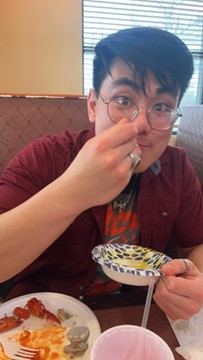
How did you secure multiple internships within the same company?
I attended last year’s career fair, where I met my manager. She told me I stood out from the rest of the candidates because I knew how to hold a conversation, was confident, and had unorthodox experience in developing my soft skills. The only professional experience I had up to that point was six years of stocking at Fareway, a grocery store. She found how I was able to use that experience in my current field unique.
My manager stated that an internship or a co-op is basically a test to see if they want to keep you as a full-time employee. She was satisfied with my performance and offered me to stay on her team and is helping me secure an internship at a different department in our Cedar Rapids location.
How has your experience aided you since returning to the University of Iowa?
Honestly, it hasn’t. Maybe if it was a software engineering co-op, it might have. But I loved every bit of working in Service Engineering and working full time. My co-op gave me a little taste of what freedom tasted like, and now that I’m back to being a student, I hate being in college even more.
What skills did you develop or enhance during your time as an intern?
Using resources to get coding projects done, communicating, and asking questions.
What tips do you have for current students seeking internships?
If you feel like you’re behind your peers, it’s okay! I felt like I saw all my classmates having much more experience than me—Leetcode solutions every day, coding since high school, and straight A’s. That’s not me, and I was terrified! However, I learned that most of those guys might be smarter than me, but they might not know how to hold a conversation or function within a team. Don’t be afraid to be yourself and make yourself stand out as a candidate by having a personality.
What was your favorite aspect of your internship?
I just enjoyed having a very consistent routine and not being in college. My team was very lovely and enjoyable to talk to. We met outside of work for events and such. It was my first time being on my own and feeling like an adult. It was awesome.
Can you see yourself in a future career with Collins Aerospace?
Absolutely, I can. My team and I did a lot of talking about different careers available within the company and I enjoy being part of it.

Madison Krohn
Major(s): 2nd Year - Computer Science BS
Interned at Northwestern Mutual
Read More in Madison Krohn's Internship Debrief
What did a typical day look like as a Software Engineer at Northwestern Mutual?
My team was required to go into the office every Tuesday and the rest of the week we would either work from home or go into the office. Regardless of if we were in the office or working from home, we would start the day with stand-up. In the stand-up meetings, we would share what we worked on the day before and what we planned to work on that day. We would also share if there were any important meetings coming up that others might want to join in on and if we needed help with anything as well. After stand-up, we would work on our own things. During my internship, I was tasked with creating this microapp for their tax configuration in the New York Metro Area and most of my day was spent working on finishing the app. I would usually take lunch at 11, and if I was in the office, I would either get lunch with my team or fellow college interns as well.
How did you navigate securing multiple internships within the same company?
When I was in high school, I was a part of a program called Girls Who Code and we learned about different coding skills for 11 weeks during the winter. The program then shared that they had this opportunity for a “Hi, Tech” minicamp over the summer at Northwestern Mutual. During the minicamp, I met other high school juniors and seniors that had a passion for coding and wanted to see what their future could look like in the technology field. We learned many coding skills such as how to use CSS, HTML, and JavaScript to build mini projects to help us understand the languages better. Towards the end of the minicamp, everyone had the chance to have mock interviews and we all got placed in a team for a mini-internship and got to work on our own without the minicamp team. I was placed on a cyber security team and worked with testing their forms that users would use to report if they were traveling for the company and their reason. My senior year of high school I had the chance to have an internship block every other day and I reached out to my coordinator from Northwestern Mutual during the minicamp, and she helped me secure an internship on one of the teams that my instructor from the minicamp worked on. During that time when I was working, I mostly was learning how to apply my skills I knew to programs that helped the team. Even though it was mini tasks to do, I improved many skills both involving coding and personal skills such as communication and teamwork. I was offered to work that summer of my senior year and continued to work on the same team and even got the chance to come into the office to work. Last summer I reached out to my boss from the last internship and asked if I could come back from the summer as a college intern and he connected me to the university relations team that handled all the college internships. During my summer at NM, it was more based around building our professional skills and skills relating to our roles as well. I met many fellow interns and listened to different speakers relating to the technology field that were at the company. I think with my internship at a corporate company, I got to see what a job in the technology field would look like in this big aspect. I would recommend the college internship to anyone that wants to see how their major would fit at a big company such as Northwestern Mutual.
How has your experience aided you since returning to study at the University of Iowa?
During my internships at Northwestern Mutual, I felt like I learned many professional skills that have helped me become a better public speaker and taught me how to communicate better with others. By working with a team, together and one-on-one, I have learned how to work proficiently to all reach our target goals for our various projects we had going on. Transitioning back to Iowa I feel like the communication skills I learned have helped me be able to speak up in class and work well with others on projects overall.
What skills did you develop or enhance during your time as an intern?
Overall, I feel like I learned many communication skills as well as further improved my coding knowledge. By working alongside other employees, I learned about collaborating and sharing ideas/constructive criticism with them as well.
What helpful tips do you have for current students seeking internships?
I think that it is never too early to apply for internships. Even if you do not end up getting the position, it is a great way to improve your interview skills and get connected with people in the field. I would say to create a LinkedIn profile that can help you look for jobs and show off your skills and achievements to employers. Also, looking at Handshake can be helpful to find openings as people are always reaching out and looking for students to fill their internship opportunities.
What was your favorite aspect of your internship?
My favorite aspect of my internship was meeting fellow interns from all over the country and from different schools. At the end of the internship this year, we had an intern showcase where we presented what we did over the summer to co-workers, and it was like a science fair-type set-up. When I was not presenting on my day, I went and listened to the other interns talk and it was cool to learn what they had been doing with their time at Northwestern Mutual.
Can you see yourself in a future career with Northwestern Mutual?
I do think I could see myself with a future career with Northwestern Mutual or a similar company. I am glad that I had the chance to be able to come back to such a great company for multiple opportunities and could grow my professional career as well.

Patrick Foster
Major(s): 4th Year - Computer Science BA | BAIS BBA
Interned at Both J.P.Morgan and GoDaddy
Read More in Patrick Foster's Internship Debrief...
Tell us about yourself and how you got into Computer Science.
I came to the University of Iowa as a Business Major. I was always interested in building software; however, I viewed that as just a hobby. During my freshman year, I started pursuing this hobby by taking an online web development course in my free time. I soon became engulfed in the programming world, building websites left and right. One day, I decided to apply for an SWE internship at JPMorgan on a whim. When I landed the job, I decided to go full-time on computer science and promptly switched my major.
Since my freshman year, programming has only become more prevalent in my life. I’ve done Hackathons, built 15+ full-stack websites, worked for GoDaddy in Seattle, and will work for Netflix when I graduate this year.
What did a typical day look like as an intern at GoDaddy/JP Morgan?
It’s your classic 9-5 job. I usually code for a few hours in the morning, then attend meetings, and finish the day by coding some more. I take frequent breaks throughout the day by socializing with the other interns and playing foosball.
How has your experience aided you since returning to study at the University of Iowa?
Having real-world experience helps to place my class material into the context of the real world. For example, learning about Agile methodologies in my software development class was much more intuitive as I’ve already worked on a team using Agile.
What skills did you develop or enhance during your time as an intern?
To land all three positions, I had to ace my technical interviews by effectively solving data structures and algorithm questions. These questions could include derivations of Dijkstra’s algorithm or finding the largest subsequence of a list of numbers. Given how few interviews I got each year, I knew this skill set had to be flawless. I estimate I’ve spent around 200 hours practicing Leetcode-styled questions.
Additionally, this independent study of algorithms made my coursework at Iowa more intuitive. Classes such as Programming Language Concepts, Software Development, Data Structures, or Algorithms became easier as I had the skillset to solve complex problems using code.
In your opinion, what is the most important thing you learned during your time as an intern?
Last summer, I was placed on one of GoDaddy’s most senior teams. Given their seniority, it was intimidating to suggest counterarguments to their decisions. Furthermore, my team intuitively knew how something should be built, meaning their specifications for my projects were ambiguous. To be able to communicate effectively, I had to be both to be assertive, confident, and thorough. Without effective communication, I would’ve done something wrong, and my superiors would’ve watered down my opinions.
What helpful tips do you have for current students seeking internships?
Use these resources religiously:
- Learn algorithms: neetcode.io
- Practice algorithms: leetcode.com
- Thousands of internships: github.com/SimplifyJobs/Summer2024-Internships
- Apply to an internship in 10 seconds: simplify.jobs
- How much an internship pays: levels.fyi/internships
- A perfect resume template: overleaf.com/latex/templates/jakes-resume/syzfjbzwjncs
What was your favorite aspect of your internship?
I’ve interned in both Seattle and Chicago these last two summers. These experiences allowed me to travel the country and meet other programmers with diverse backgrounds. Getting such a breadth of viewpoints on the world and its technology has been eye-opening.
What's New with You? Send us Your News...
UIowa CS students and grads: Do you have an internship story to tell? Or, maybe a recent promotion, award, published article or career achievement? Let us know!
